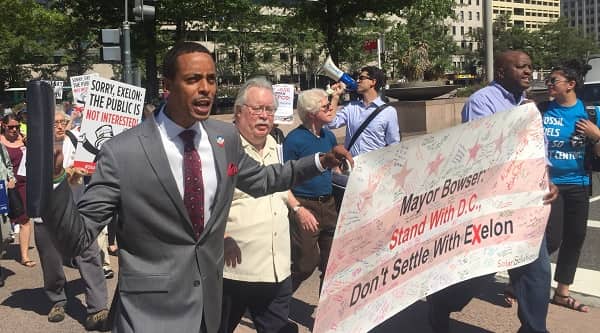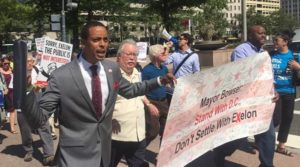Pepco wants more of your money…again


It looks like Pepco just can’t stop itself from reaching into your wallet.
Solar United Neighbors, and many of our supporters, have a long history with Pepco. Many of you fought with us as part of the PowerDC Campaign to oppose Pepco’s merger with utility giant Exelon Corporation. As you may remember, our concerns were that the new Exelon mega-utility wouldn’t be in sync with DC on issues such as rates, renewables, and reliability. Despite our efforts as a broad and deep grassroots coalition fighting against the merger, the D.C. Public Service Commission (DCPSC) ultimately sold us out and supported the merger.
Now we must deal with the consequences.
In 2016, scant months after the merger was finalized. Pepco requested an $85.5 million increase in distribution rates, its largest rate case in a decade. The Office of People’s Council fought hard against the rate increases and revealed Pepco was seeking to recover operating expenses, including excessive perks for Pepco executives that should not have been proposed for ratepayers. That request was subsequently reduced to $77.5 million, and the DCPSC ultimately approved a $36.9 million increase in a July 24, 2017.
Now, less than a year later, Pepco has applied for an additional $66 million rate increase. The filing can be found on the DCPSC’s website (For the super wonks, see FC 1150 and supplement). The average monthly bill would go up $7.54 from the proposal. The new request includes numerous troubling signs that Pepco is not supporting DC’s broad clean energy goals.
In particular, this request includes a proposal to add “residential demand charges” to our monthly electric bill. Residential demand charges are a particularly unfair, confusing, and unpredictable rate increase because of how it is calculated and how it can impact your bill for the rest of the year.
Typically, demand charges have been applied to large commercial operations, where the impact of the energy use—say to run a factory full of equipment—would materially impact the amount of energy the grid needed to supply. Residential demand charges, on the other hand, make no sense and are punitive to those who try to lower their bills by using less energy overall.
The demand charge proposed by Exelon would be based on the peak level of demand by each individual ratepayer each month averaged over the previous year (again, for the super wonks, see p. 1218 for the key portion of the initial FC 1150 filing for details). This means that if you had one specific day where your energy use spikes, it could change the rate you pay for electricity for your whole year.
For example, say you are an elderly grandma carefully keeping your electric bill as low as possible. One day you host a graduation party for your grandson. The kids come over, blast some speakers, play video games on the TV, make 10 bags of popcorn in the microwave, charge an electric vehicle, and someone leaves the fridge door open. Instead of a one-day blip on your bill, where your energy use goes up but the rate stays predictable, you could see an increase to your monthly charges for the rest of the year as a result of a rate increase triggered by this one usage peak.
We’ve seen this move in other markets where utilities are aiming to discourage ratepayers from going solar and make it harder for them to control their electric bills. They also run counter to D.C.’s policies that encourage energy efficiency and solar throughout the District by increasing your electric bill even if your energy use from the grid is reduced. And it will undermine the progressive Solar for All program, D.C.’s groundbreaking low-income solar program, by making it harder for low- and moderate-income residents to reduce their electric bills by 50% through solar installations.
Solar for All, a program of the District of Columbia’s Department of Energy and Environment, seeks to provide the benefits of solar electricity to 100,000 low-income households and reduce their energy bills by 50% by 2032. The program, which was established by the Renewable Portfolio Standard (RPS) Expansion Amendment Act of 2016, is funded by the Renewable Energy Development Fund (REDF). For more information about Solar for All visit: http://doee.dc.gov/solarforall.
While Pepco insists that the rate increase is needed to pay for necessary upgrades to our electricity generation system, we know that they have continually failed to explore more cost effective (and therefore less profitable to their shareholders) alternatives. This latest attempt to extract more money through demand charges is even more odious.
Pepco may think they can push us around, but we won’t back down.
Our solar army is ready to fight back!
Join us in standing against these unfair and unnecessary demand charges on our electric bill by signing our petition now! By signing now, we’ll keep you updated on this latest rate increase effort by Pepco and keep you informed on how you can fight back!
